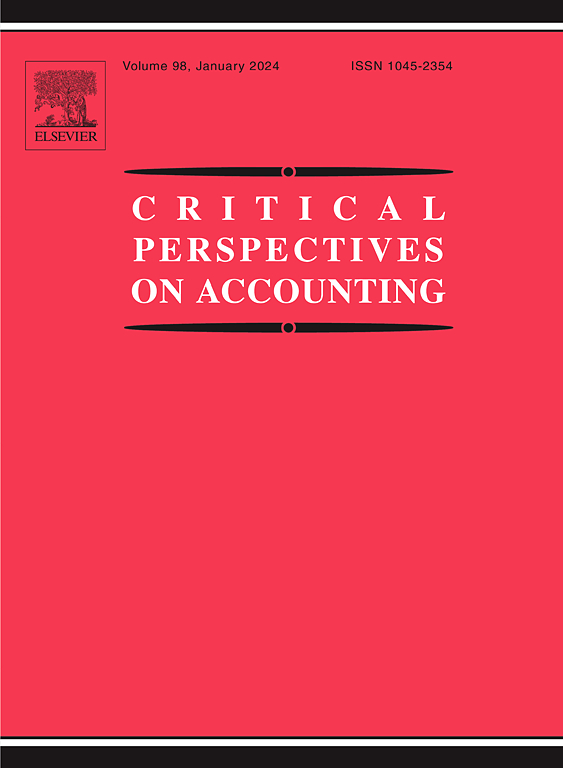反思在关键会计学术中的作用问题化:一位北方人种学家在全球南方的案例
IF 5.7
2区 管理学
Q1 BUSINESS, FINANCE
引用次数: 0
摘要
在批判性会计学术中,我们开始明白,我们学术领域的持久殖民性限制了它的可能性和潜力,对它试图理解的人造成伤害,并疏远了希望利用他们的研究影响世界的批判性会计研究人员。含蓄地说,作为一个批判性学者的群体,我们集体和个人都把目光投向了我们自己,我们的纪律以及它所处的结构和约束,对摆脱殖民主义几乎没有任何帮助,有时反而有助于延续和扩大殖民主义。然而,本文认为,当我们使用这种自反性敏感性来客观化我们自己、我们的研究和我们所处的结构时,我们一直在努力表明这对我们的会计研究有什么不同。作者的经验,作为全球南方的北方民族志研究者,被用来说明这些限制,当前模式的反身性用于关键会计。最后根据Knafo (2010, 2016;Knafo,Teschke, 2021)关于我们如何在非殖民化项目中更好地利用反身性。本文章由计算机程序翻译,如有差异,请以英文原文为准。
Problematising the role of reflexivity in critical accounting scholarship: The case of a Northern ethnographer in the Global South
Within critical accounting scholarship, we are beginning to understand that the enduring coloniality of our academic field limits its possibilities and potential, inflicts harm on the very people it seeks to understand and alienates critical accounting researchers hoping to use their research to impact the world. Implicitly, as a community of critical scholars we have both collectively and individually turned the gaze on ourself, our discipline and the structures and constraints it operates under that has done little to escape coloniality and, at times, serves to perpetuate and extend it. Yet this paper contends that while we use this reflexive sensibility for objectivating ourselves, our research and the structures we operate within, we have struggled to show what difference this makes to our study of accounting. The author’s experience, as a Northern ethnographic researcher within the Global South, is used to illustrate these limitations to current modes of reflexivity used in critical accounting. It concludes by offering some tentative suggestions based on Knafo (2010, 2016; Knafo & Teschke, 2021) on how we might put reflexivity to better use in the project of decoloniality.
求助全文
通过发布文献求助,成功后即可免费获取论文全文。
去求助
来源期刊

Critical Perspectives on Accounting
BUSINESS, FINANCE-
CiteScore
9.40
自引率
7.80%
发文量
91
期刊介绍:
Critical Perspectives on Accounting aims to provide a forum for the growing number of accounting researchers and practitioners who realize that conventional theory and practice is ill-suited to the challenges of the modern environment, and that accounting practices and corporate behavior are inextricably connected with many allocative, distributive, social, and ecological problems of our era. From such concerns, a new literature is emerging that seeks to reformulate corporate, social, and political activity, and the theoretical and practical means by which we apprehend and affect that activity. Research Areas Include: • Studies involving the political economy of accounting, critical accounting, radical accounting, and accounting''s implication in the exercise of power • Financial accounting''s role in the processes of international capital formation, including its impact on stock market stability and international banking activities • Management accounting''s role in organizing the labor process • The relationship between accounting and the state in various social formations • Studies of accounting''s historical role, as a means of "remembering" the subject''s social and conflictual character • The role of accounting in establishing "real" democracy at work and other domains of life • Accounting''s adjudicative function in international exchanges, such as that of the Third World debt • Antagonisms between the social and private character of accounting, such as conflicts of interest in the audit process • The identification of new constituencies for radical and critical accounting information • Accounting''s involvement in gender and class conflicts in the workplace • The interplay between accounting, social conflict, industrialization, bureaucracy, and technocracy • Reappraisals of the role of accounting as a science and technology • Critical reviews of "useful" scientific knowledge about organizations
 求助内容:
求助内容: 应助结果提醒方式:
应助结果提醒方式:


